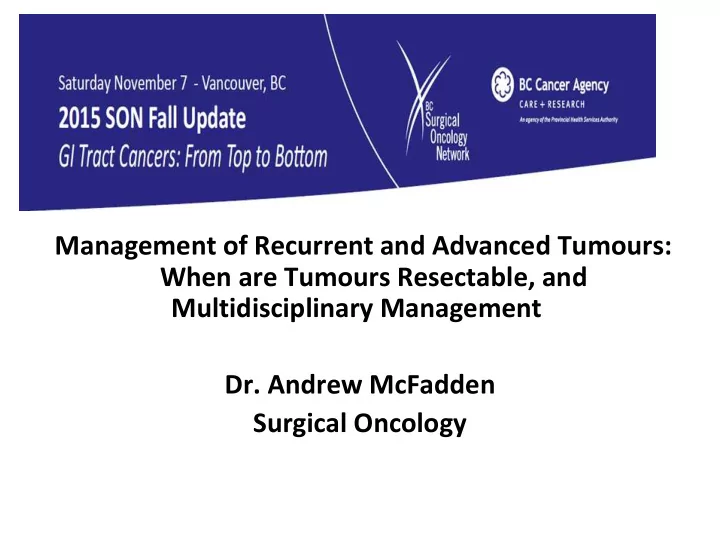

• Management of Recurrent and Advanced Tumours: When are Tumours Resectable, and Multidisciplinary Management Dr. Andrew McFadden Surgical Oncology
Management of Recurrent and Advanced Tumours: When are Tumours Resectable, and Multidisciplinary Management
Management of Recurrent and Advanced Tumours: When are Tumours Resectable, and Multidisciplinary Management
What I used to know ! Resectability – Gastric 1.positive cytology 2.surgical palliation 3.multiorgan resection
What I used to know ! Resectability –Colon and rectal 1.retroperitoneal lymph node recurrences 2.Involvement of pelvic side wall & sacrum 3.Lung mets/ lung mets and liver mets 4. Unresectable 5.Peritoneal seeding
Recurrent and Metastatic Disease: outcomes
Recurrent and Metastatic Disease :outcomes
Surgery for nodal recurrences
1. Surgery for nodal recurrences
1. Surgery for nodal recurrences
1. Surgery for nodal recurrences Systematic review HO,Mack,Temple 2011 110 patients : series from 1993 ‐ 2010 median survival 34 ‐ 44 months’ median DFS 17 ‐ 21 months Too heterogeneous for prime time
2. Local recurrence & locally advanced disease Clinical, MRI, and PET ‐ CT Criteria Used by Surgeons to Determine Suitability for Pelvic Exenteration Surgery for Recurrent Rectal Cancers: A Delphi Study. Chew, Min ‐ Hoe; Brown, Wendy; Masya, Lindy; Harrison, James; Myers, Eddie; Solomon, Michael Diseases of the Colon & Rectum. 56(6):717 ‐ 725, June 2013. DOI:
2. Local recurrence & locally advanced disease Clinical, MRI, and PET ‐ CT Criteria Used by Surgeons to Determine Suitability for Pelvic Exenteration Surgery for Recurrent Rectal Cancers: A Delphi Study. Chew, Min ‐ Hoe; Brown, Wendy; Masya, Lindy; Harrison, James; Myers, Eddie; Solomon, Michael Diseases of the Colon & Rectum. 56(6):717 ‐ 725, June 2013. DOI: 10.1097/DCR.0b013e3182812bec
2. Local recurrence & locally advanced disease
2. Local recurrence & locally advanced disease
2. Local recurrence & locally advanced disease
3. VISCERAL METASTESES I can’t figure out who is eligible for a liver resection! Basingstoke index: 3 hepatic mets Node positive primary Poorly differentiated primary Extrahepatic disease Tumour > 5 cm Worst 0.7 years Best 7.4 years
3. VISCERAL METASTESES
3. VISCERAL METASTESES . Lung mets should be considered potentially resectable with or without liver mets . Liver mets with hepatic nodes don’t do well . Delphi study done in Ontario showed very poor agreement between HPB surgeons in 8 scenarios
Neoadjuvant chemotherapy: Who? Neoadjuvant or adjuvant Resectable or unresectable 4. Advanced and Unresectable Disease
Neoadjuvant chemotherapy: 4. Advanced and Unresectable Disease
Neoadjuvant chemotherapy: Why? Micro metastases Evaluate chemo responsiveness Shrink tumour 4. Advanced and Unresectable Disease
4. Advanced and Unresectable Disease IS chemo beneficial for patients with initially resectable liver mets? Many studies no survival benefit EORTC 40983 benefit
FOLFIRI ( 16% with FOLFOX) with irinotecan with become resectable 32% unresectable based regimens or oxaliplatin resectable become 50% potentially resectable resectable? to Can chemo convert unresectable 4. Advanced and Unresectable Disease
Role of biologics uncertain: FOLFOXIRI : 28% histopathologic response FOLOXIRI & bev: 63% 4. Advanced and Unresectable Disease
Management of Recurrent and Advanced Tumours: When are Tumours Resectable, and Multidisciplinary Management
Management of Recurrent and Advanced Tumours: When are Tumours Resectable, and Multidisciplinary Management 1.Advanced, recurrent and metastatic disease can be cured 2.Indications keep changing 3.Teams necessary 4.Few standard protocols 5.MDT conferences mainstay 6.Resource intense 7.M & M must be acceptable
Recommend
More recommend